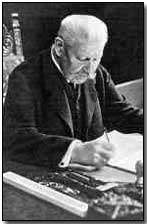Primary Documents - Hindenburg and Foch's Armistice Telegrams, 7 November 1918
 With German military morale
in evident decline on the Western Front and revolution brewing at home -
Kaiser
Wilhelm II was himself obliged to abdicate on 9 November 1918 -
the German government determined to
negotiate an armistice with the Allies
on 6 November, having issued preliminary diplomatic feelers two days
earlier.
With German military morale
in evident decline on the Western Front and revolution brewing at home -
Kaiser
Wilhelm II was himself obliged to abdicate on 9 November 1918 -
the German government determined to
negotiate an armistice with the Allies
on 6 November, having issued preliminary diplomatic feelers two days
earlier.
Consequently on 7 November the German Army Chief of Staff Paul von Hindenburg exchanged a series of telegrams with the Supreme Allied Commander, Ferdinand Foch (reproduced below), to agree a date, time and place for formal negotiations. (Click here and here to read Allied eyewitness accounts of the armistice negotiations; click here to read an account by a German delegate.)
Although Germany had insisted that it would only enter into negotiations on the understanding that U.S. President Woodrow Wilson's so-called 'Fourteen Points' would form the basis for a settlement, the armistice terms were nevertheless punitive. The Allies agreed to an armistice only on the basis that Germany effectively disarm herself, thereby preventing the latter from renewing hostilities.
The Allies' armistice terms were presented to German negotiators on 8 November 1918; alarmed at the severity of the terms the Germans lodged formal protests before reluctantly signing at 5 a.m. on 11 November; the armistice was to come into effect six hours later, at 11 a.m.
President Wilson shortly afterwards announced details of the armistice to Congress, and further celebrated the agreement in a Thanksgiving Address at the close of the month.
Telegraph from Paul von Hindenburg to Ferdinand Foch, 12.30 a.m. 7 November 1918
German General Headquarters to the Allies' General Headquarters; the German Commander-in-Chief to Marshal Foch:
The German Government, having been informed through the President of the United States that Marshal Foch had received powers to receive accredited representatives of the German Government and communicate to them conditions of an armistice, the following plenipotentiaries have been named by it:
Mathias Erzberger, General H. K. A. von Winterfeld, Count Alfred von Oberndorff, General von Gruennel, and Naval Captain von Salow.
The plenipotentiaries request that they be informed by wireless of the place where they can meet Marshal Foch. They will proceed by automobile, with subordinates of the staff, to the place thus appointed.
Telegraph from Ferdinand Foch to Paul von Hindenburg, 1.30 a.m. 7 November 1918
To the German Commander-in-Chief:
If the German plenipotentiaries desire to meet Marshal Foch and ask him for an armistice, they will present themselves to the French outposts by the Chimay-Fourmies-La Capelle-Guise road.
Orders have been given to receive them and conduct them to the spot fixed for the meeting.
Telegraph from Paul von Hindenburg to Ferdinand Foch, 1 p.m. 7 November 1918
The German plenipotentiaries for an armistice lease Spa today. They will leave here at noon and reach at 5 o'clock this afternoon the French outposts by the Chimay-Fourmies-La Capelle-Guise road.
They will be ten persons in all, headed by Secretary of State Erzberger.
Telegraph from Paul von Hindenburg to Ferdinand Foch, 1.50 p.m. 7 November 1918
German General Headquarters to the Allied General Headquarters:
The Supreme German Command to Marshal Foch:
From the German outposts to the French outposts our delegation will be accompanied by a road-mending company to enable automobiles to pass the La Capelle road, which has been destroyed.
Telegraph from Paul von Hindenburg to Ferdinand Foch, 6 p.m. 7 November 1918
The German Supreme Command to Marshal Foch:
By reason of delay the German delegation will not be able to cross the outpost line until between 8 and 10 o'clock tonight at Haudroy, two kilometres northeast of La Capelle.
Source: Source Records of the Great War, Vol. VI, ed. Charles F. Horne, National Alumni 1923
'minnie' was a term used to describe the German trench mortar minnenwerfer (another such term was Moaning Minnie).
- Did you know?
